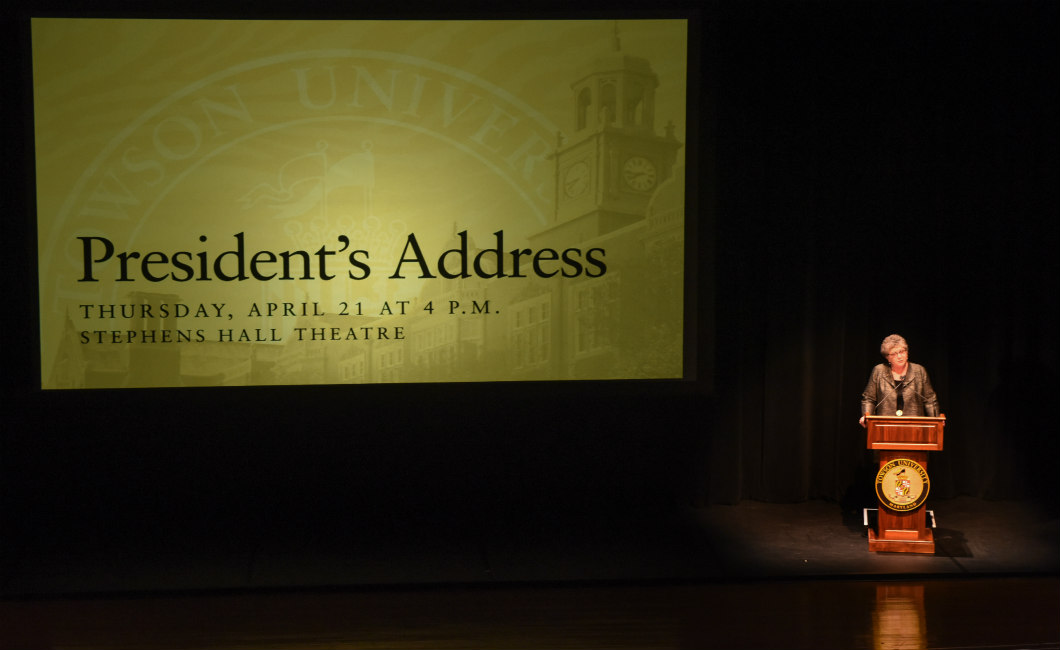President Kim Schatzel gives her first address to the campus
"What I came away with in the simplest of terms is the strong belief that TU is indeed positioned for a very bright future, building upon the past decade of enormous growth and achievement."

Towson University President Kim Schatzel gave her first campus address Thursday afternoon in Stephens Hall Theatre. Among the speech's highlights were the introduction of the new position of Chief Inclusion and Institutional Equity Officer, the creation of a faculty development center, and a new initiative called the TIGER Way.
Schatzel began her address by updating the audience on the progress of the new science facility as well as obtaining a new building for the College of Health Professions, noting there are over 20,000 unfilled health professions jobs in Maryland and,
"We are uniquely positioned to fulfill the state's workforce needs in this industry with the sheer quantity and quality that no other university can match," Schatzel said.
She moved on to discussing what she learned from her first 90 days of listening before outlining the priorities that emerged for her from the listening tour and what actions will be taken to realize those priorities.
"What I came away with in the simplest of terms is the strong belief that TU is indeed positioned for a very bright future, building upon the past decade of enormous growth and achievement," Schatzel said. "But that this optimism is coupled with genuine concerns about the strength and stability of the foundation that we as a university are currently sitting on."
In an effort to address those concerns, she laid out the following priorities:
- To retell the Towson University story in a much more compelling and distinct manner
that is reflective of the university of today:
In an initiative called "TU Matters to Maryland," the university will complete a brand audit followed by the roll out of a comprehensive communication strategy to effectively tell all audiences what makes TU distinct, valuable and why in 2016 and beyond, TU matters to Maryland. - To make TU a more diverse and inclusive campus:
In response to comments that the campus is not welcoming to all students, a new position of Chief Inclusion and Institutional Equity Officer, will provide senior leadership and strategic vision for the design, promotion, and delivery of best-practice diversity, inclusion and cultural competency efforts across this campus and throughout our community. The goal is to have this office and this individual in place by early next year. - To invest in infrastructure and facilities to directly support the faculty in their
teaching:
Beginning summer 2016, the Provost to work with the deans, chairs, and faculty on a multiple-year plan to create a world-class Faculty Development Center that will include the Office of Academic Innovation. The plan will include specific funding requirements for facilities space, technology, collaborative space, seminars, teaching workshops, and other resources such as staff and stipends to support faculty and promote academic innovation such as flipped classrooms and problem-based learning in course redesign.
- To align TU's vision, strategic plan, the strategic plans of the divisions and colleges,
and the Campus Master Plan:
Outcomes of this multi-year process will include the beginnings of an operating plan and funding model to support strategic goals such as a financially stable, gender-equitable, and competitive athletics program and expanding, not just maintaining, TU's national and international reputation in arts and communication.
- To build a culture of philanthropy:
In order to launch a new capital campaign, the university will conduct a campaign feasibility study this fall to determine the campaign’s potential as well as provide a strategy for its achievement. - To better support the entire student population, especially the transfer, international
and graduate students:
Each student population has its own distinct needs and universities can no longer focus primarily on the traditional undergraduate student. To that end, the Transfer, International, Graduate Enrollment Resource Initiative (the TIGER Way) will provide a detailed enrollment model to inform programs and priorities for investment to better support these so so important student populations that mean so much to TU’s success and the vitality of the campus. The initiative will examine graduate assistantships, academic advising, and an enhanced career center.
Schatzel also reaffirmed her commitment to creating a diverse, inclusive campus environment and improving the hate/bias reporting process.
"A diverse and inclusive classroom and campus provides that our graduates have learned
to both thrive and support others to thrive in an environment inclusive of race, ethnicity,
religion, gender identity, sexual orientation, and able-ness," Schatzel said.
"In a global economy increasingly characterized by multiculturalism," she added, "Towson
University graduates who thrive and support others to thrive in a diverse and inclusive
environment will leave our campus better prepared, and thus advantaged for the world
of work and graduate education."
Before she concluded her address, which was streamed live on the university's Facebook page, the university's 14th president struck an optimistic tone for the future of the 150-year-old former teachers' college.
"TU does not need to change its path," Schatzel stressed. "TU needs to stay true to its DNA and simply put, Towson University needs to be more Towson, and we need to shout loudly and often that TU Matters to Maryland."